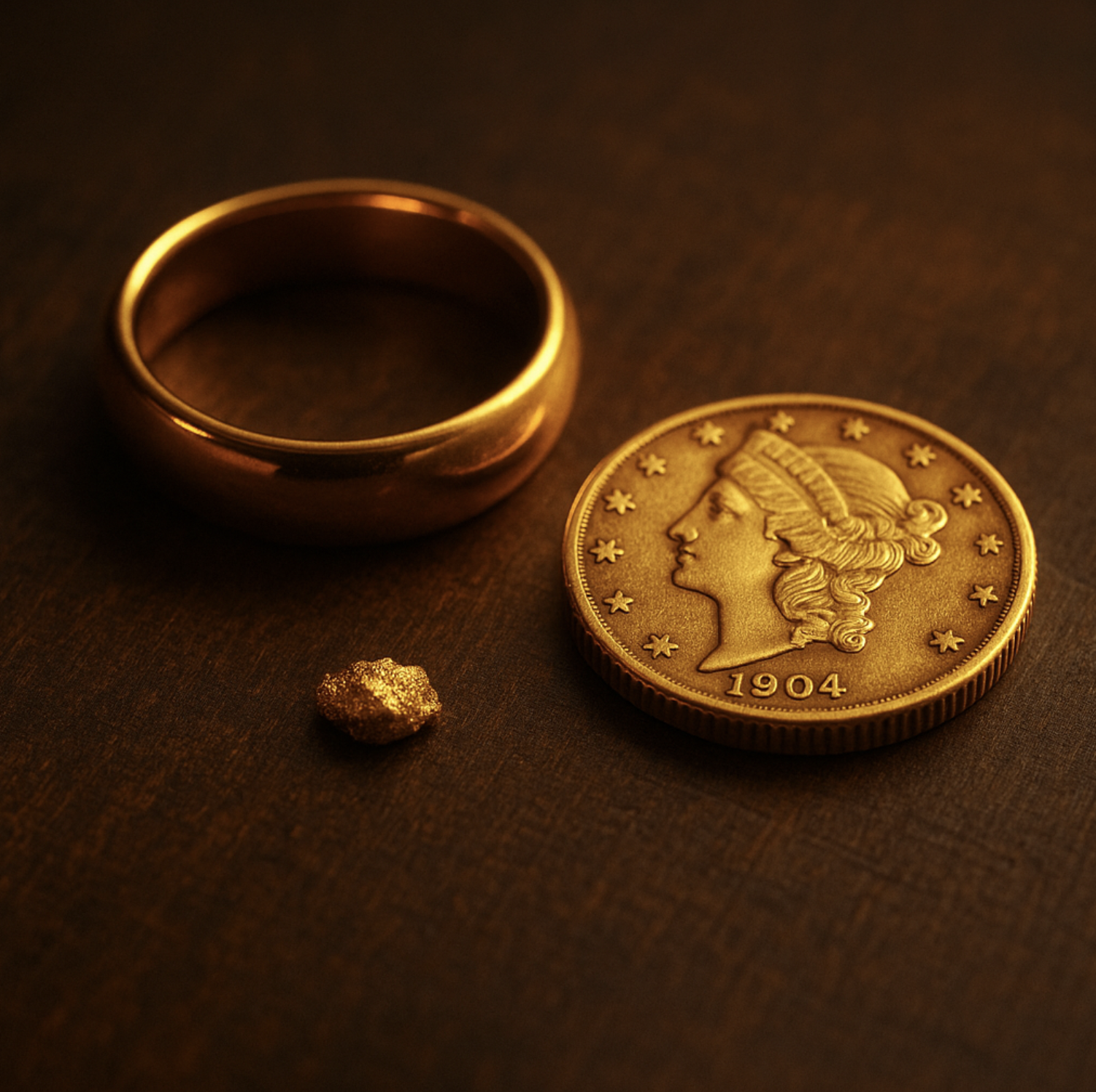The Earth’s Core Is Leaking Gold: A Hidden Alchemy Beneath Our Feet
We always imagined the Earth’s core as a kind of hell: seething iron and pressure, too violent and unreachable to ever touch. But what if it wasn’t just a furnace? What if it was a vault?
And now, scientists say:
It’s leaking.
Gold.
From the very heart of the planet.
It’s not the stuff of legends about dragons curled atop treasure piles or rivers turned gold in the light of a dying sun.
This is a paper in Nature. This is geophysics, thermodynamic modeling, elemental migration.
This is real.
The Earth is spilling its secrets…and among them is gold.
Gold in the Furnace: What the Study Found
Published in Nature in 2024, the study rocked the geoscience world. Researchers found that Earth's core: the inner sanctum of our planet, 3,200 miles below our feet…is not a closed, sealed-off sphere of molten iron. It's bleeding into the mantle, sending tiny but measurable amounts of gold, platinum, iridium, and other siderophile (iron-loving) elements upward.
This slow leak isn't dramatic. There's no geyser of treasure.
But through ultra-high pressure experiments and isotopic modeling, scientists confirmed that over billions of years, the Earth’s core has been dripping metal into the overlying mantle.
And it changes everything we thought we knew about planetary formation.
The Core Was Never Empty, It Was Hoarding
To understand why this is such a big deal, you have to travel back…to the very beginning.
Not of humanity. Of Earth itself.
When our planet was still young, molten, and chaotic, heavy metals like gold and platinum sank, pulled by gravity into the center of the Earth. That’s why most of Earth’s gold ended up in the core…locked away forever.
Or so we thought.
Scientists long believed that any gold near the surface today arrived later, delivered by meteorites after the core had sealed itself shut.
The so-called Late Veneer Hypothesis.
But this new study rewrites the script. It says:
The core has been leaking gold back into the Earth’s body all along.
Like a forgotten god bleeding into the soil.
Like the planet itself is returning wealth to the surface.
Not in rivers or torrents, but in slow, sacred alchemy.
How Does Gold Escape the Core?
At the center of the Earth, temperatures reach over 9,000°F (5,000°C). Pressures are millions of times greater than at the surface. It is not a place metals are meant to move freely.
And yet, scientists now believe that chemical reactions at the boundary between the core and the mantle can coax gold atoms to migrate upward.
It’s a bit like salt diffusing into soup.
Over time, the flavor rises.
This transfer is so subtle, so patient, that it only becomes noticeable over geological time spans.
But the implications are massive, because it means that some of the gold we mine today was not delivered by meteors, but slowly brewed from Earth’s own molten heart.
The planet is still making treasure.
What This Means for Gold on Earth
Let’s pause for a moment. Not as scientists. As humans.
The gold in your wedding band?
The flake in a prospector’s pan?
The nugget hidden in a riverbend in Alaska?
Maybe it wasn’t just ancient.
Maybe it was from Earth’s core, a drop of molten memory pushed upward by time and pressure, rising like a tear from the eye of the planet.
Gold has always been a symbol. Of royalty. Of divinity. Of eternity.
But what if it was also a message?
A whisper from the deep: I am still here. I am still creating.
This is not just geology.
It’s planetary poetry.
The Mythology Beneath the Science
Long before science found it, ancient cultures intuited this.
The Incas called gold the “sweat of the sun.”
In Greek mythology, it was the blood of the gods, flowing through the earth.
In Hindu texts, gold was said to be formed from the fire of creation, the same fire that forged the universe.
What science calls siderophile behavior, myth calls sacred origin.
And now, we know they weren’t entirely wrong.
The planet is bleeding gold. Not from wounds, but from continuing creation.
There’s something deeply humbling in this. That after all this time, Earth is not done.
She is still making beauty in the dark.
Still offering us gold, one molecule at a time.
What Else Is Leaking?
Gold is only one of the core’s gifts.
The study also found evidence of:
Platinum
Tungsten
Rhenium
Palladium
And traces of iridium (one of the rarest metals on Earth!)
These elements have industrial and technological uses…from spacecraft to semiconductors to catalytic converters. But beneath the utility is a deeper truth:
The center of the Earth is not a static place.
It is alive with transformation.
The Core-to-Mantle Conveyor
Imagine Earth as a breathing body. The core is the heart, pumping out molten metal. The mantle is the bloodstream. The crust is the skin.
This flow, from core to mantle, suggests Earth has an internal circulatory system, one that slowly delivers rare elements upward.
Not all at once.
Not for us to strip and steal.
But as part of a larger rhythm…the Earth giving back what it once took in.
This is not mining.
It is metamorphosis.
Why It Matters Beyond the Science
This isn’t just news for geologists.
It’s a reminder that the Earth is not a spent planet. It hasn’t stopped evolving. It hasn’t gone cold.
It still dreams in gold.
Still breathes metal into stone.
Still pulses with possibility underfoot.
And in a world where we’re so quick to extract, exploit, and abandon, this discovery invites a different response:
Reverence.
The core is not an infinite vault.
But it is a generous one.
And it reminds us that the most miraculous things often happen slowly, invisibly, and under immense pressure.
The Hollow Sound of Greed
It’s tempting to hear the phrase “Earth is leaking gold” and think of wealth. Extraction. Opportunity.
But what if that instinct is the very thing we need to unlearn?
The Earth is not coughing up coins.
It is whispering minerals into stone.
What leaks from the core is not an invitation to dig, but a demonstration of patience…how something so valuable can rise slowly, invisibly, through pressure and time.
We hear “gold” and see markets. The planet offers it and means grace.
If we rush to claim it, we misunderstand the offering entirely.
This isn't a dragon’s hoard.
It's a love letter written in metal.
The Earth’s Core as a Memory Bank
The inner core of the Earth is about 1,600 miles wide: solid iron surrounded by a liquid outer core. But beyond its physics, it may also be something more poetic: a memory bank.
It holds the story of planetary formation, written in pressure and composition.
It remembers collisions, separations, the great iron rain that sank heavy elements into its center.
And now, through the slow leak of gold, it is telling that story again.
Gold isn’t just valuable because it’s rare. It’s valuable because it’s ancient: an echo from the Earth’s beginning, slowly making its way to the surface like a forgotten name returning to the tongue.
We think of memory as fragile. But Earth’s memory is forged in fire.
And now, it’s bleeding through the cracks.
Listening to the Planet’s Signals
Most of us don’t think of Earth as a communicator.
We speak of earthquakes and eruptions as disasters, not messages.
But the leaking of gold suggests a kind of geologic murmur, a subtle language of element and energy.
Maybe the Earth has been trying to speak this whole time, not in words, but in gifts.
The rise of rare metals might be her way of saying:
“I’m still alive. I’m still moving. You are not standing on a dead rock, you are standing on a becoming.”
To listen, we must stop shouting our desires at the planet and instead place an ear to the crust.
What does gold sound like when it rises?
A bell?
A breath?
A beginning?
Gold as a Teacher
In a world obsessed with speed, gold is a teacher of slowness.
It does not race.
It does not announce itself.
It emerges through eons.
It teaches that value is not in visibility, but in origin. That what is buried is not always lost, it is becoming.
It tells us that pressure is not always punishment…it is preparation.
Gold leaked from the Earth’s core is not a reward.
It is a reminder:
That brilliance often starts in the dark, and the rarest things rise quietly.
What the Gold Could Become
Think of what this means, metaphorically.
That transformation can come from the darkest places.
That value can rise slowly, in molten patience.
That even when something seems buried, sealed, unreachable…it might still be changing.
That worth does not always come from the stars, it might come from within.
This isn’t just Earth science.
It’s soul science.
What if we, too, are still leaking gold?
Check out this raw gold nuggets from Etsy! – Keep it on your desk to remember: some treasure is earned not by speed, but by slow, sacred pressure.
What Comes Next?
Scientists are now racing to understand how widespread this phenomenon is, and whether other planets do the same.
If Earth’s core leaks gold, might Mars’s core leak something else?
Might Venus bleed lead?
What does this mean for planetary formation, economics, even space mining?
And more hauntingly:
How much gold remains in the Earth’s belly?
And will we ever learn to leave it alone?
Earth as Alchemist
They told us alchemy was a myth.
That you couldn’t make gold.
That turning base metals into treasure was foolishness.
But it turns out:
Earth has been doing it all along.
At the pressure of a billion atmospheres.
At the heat of 9,000 degrees.
In the dark, sacred silence of the core.
No philosopher’s stone. No spell.
Just time.
And patience.
And planetary grace.
So next time you hold something golden…a ring, a coin, a flake of dust in a miner’s palm, remember:
You are holding a secret from the center of the world.
You are holding proof that Earth is still dreaming.
Still creating.
Still spilling treasure from its soul.
Reads You Might Enjoy from the Archive:
The French Farmer Who Found a $4 Billion Gold Mine, and Lost It
Crypto Goes Corporate: What Coinbase Joining the S&P 500 Says About the Future of Wealth
Death of the Penny: Why America’s Smallest Coin Is Finally Getting the Axe
The Rise of the ‘Average’ Millionaire, And Why It’s Not What It Used to Be
A Trillion in the Dust: Why the Moon Might Be the Next Gold Rush
Poured, Then Forgotten: The Hidden Economics of the Sommelier

